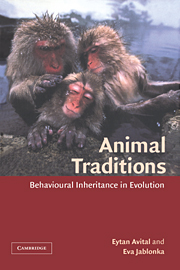Book contents
- Frontmatter
- Contents
- Preface
- Acknowledgements
- 1 New rules for old games
- 2 What is pulling the strings of behaviour?
- 3 Learning and the behavioural inheritance system
- 4 Parental care – the highroad to family traditions
- 5 Achieving harmony between mates — the learning route
- 6 Parents and offspring – too much conflict?
- 7 Alloparental care – an additional channel of information transfer
- 8 The origins and persistence of group legacies
- 9 Darwin meets Lamarck – the co-evolution of genes and learning
- 10 The free phenotype
- References
- Index of species
- Index of subjects
9 - Darwin meets Lamarck – the co-evolution of genes and learning
Published online by Cambridge University Press: 28 October 2009
- Frontmatter
- Contents
- Preface
- Acknowledgements
- 1 New rules for old games
- 2 What is pulling the strings of behaviour?
- 3 Learning and the behavioural inheritance system
- 4 Parental care – the highroad to family traditions
- 5 Achieving harmony between mates — the learning route
- 6 Parents and offspring – too much conflict?
- 7 Alloparental care – an additional channel of information transfer
- 8 The origins and persistence of group legacies
- 9 Darwin meets Lamarck – the co-evolution of genes and learning
- 10 The free phenotype
- References
- Index of species
- Index of subjects
Summary
In this chapter we are going to look at tradition, genes and learning all at once, as they interact during evolution. We have shown in previous chapters how, irrespective of any genetic change, social learning can lead to independent cultural evolution and promote speciation. When the role of the transmission of learnt information is recognised, interpretations of the evolution of many important behaviours are altered. However, for a more complete picture of what happens during behavioural evolution, we need to look at the type of genetic changes that occur during the evolution of the mechanisms of learning and the various forms of memory. We need to know what drives the evolution of learning, and in what kinds of environments it is likely to evolve. Learning is not a monolithic process, of course. For example, the development of bird song involves imprinting-like learning, trial-and-error learning and several types of social learning, all entwined. The same is true of the development of behaviours such as foraging, hunting, mobbing and even of nest building, the once classical illustration of an ‘instinct’. So how do these different types of learning evolve, and how does behavioural transmission across generations affect learning and other processes and characters? In what follows, we are going to argue that learning is an important agent of its own evolution – that the evolution of learning is, to a large extent, self-propelled.
- Type
- Chapter
- Information
- Animal TraditionsBehavioural Inheritance in Evolution, pp. 304 - 351Publisher: Cambridge University PressPrint publication year: 2000



